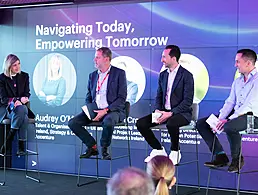Have you ever thought about switching careers to pharma? Joanne Mackey didn’t need a pharmaceutical background to do it.
The idea of changing your career can be scary, but you shouldn’t be too afraid to do so, even if you think you don’t have the right experience for where you want to go next.
The skills you learn along your own career track can be invaluable to another industry.
Joanne Mackey had no background in pharma when she came home to Ireland in the summer of 2016.
A year later, she now works in quality assurance for Amneal Pharmaceuticals, a generic drug manufacturer based in Cashel, Co Tipperary.
Originally, Mackey was pursuing a very different career path in geoscience. “I started off in earth and environmental systems science down in Cork,” she said. “At the end of the first year, I was offered to go and take part in a course called international field geoscience.”
Through that course, Mackey was based in Montana for a year, where she spent time collecting samples in Yellowstone National Park.
“The thing I loved about geology was the fact that your lab was basically outside.”
After graduating in 2011, Mackey undertook a two-year research master’s degree, specialising in micropalaeontology. “It’s a field called palynology. Basically, you’re looking at microfossils and you’re using them to try and understand climates and the environment from 80m years ago.”
Time for a change
Following her degree, she went on to work in the oil and gas industry, specifically at RPS Energy in the UK. Mackey worked there for three years before a career change was on the cards.
“The oil and gas industry was on a downturn, but it wasn’t really just that I wanted to come and work in Ireland,” she said.
“I didn’t want to do another master’s degree. I wanted to use my skills that I gained through geology and micropalaeontology in an industry that was growing in Ireland.”
When she evaluated her skill set, she found that pharma matched best with what she had already done and she could see it was a growing industry in Ireland.
“I looked at my skills and what industry I would fit into, and a lot of the work I did at RPS would have been organising sampling, coordinating with labs, writing technical reports and making decisions based on reports,” she said.
“It was the pharmaceutical industry that fitted into that bracket.”
‘What you’re doing could be helping someone’s life’
– JOANNE MACKEY
She then found a level 8 course run by Innopharma, an industry-led education and technology institute.
“I set myself the goal of giving myself one year to try and retrain in Ireland and if I can do that, I’ll stay,” she said.
After completing this, and a subsequent validation course, Mackey secured a job in Amneal, working on in-process quality assurance.
The Cashel operation has about 70 people, which, Mackey said, makes it very dynamic. “You kind of get to get your hands stuck in on all aspects,” she said.
“They’re doing research and development work for two types of inhalers at the moment, so I’m getting experience in both of those processes.”
After having the outside world as her lab in her previous field, what is it about pharma that made her happy to return to a normal, indoor environment?
“I think biopharma is a really interesting area, it’s growing, and what you’re doing means you could be helping someone’s life.”
Finding the parallels
Mackey said her background in environmental science and her understanding of microbes from palynology made certain elements very familiar to her when she entered pharma.
“I had to learn a lot about the regulatory stuff. I had to go over all the guidelines,” she said. “Then again, in oil and gas, you still have to get licensing to drill, so it was different … but in ways, there were parallels as well.”
When it comes to making a career change within the science sector, Mackey advised others to look for the places where your skills overlap and don’t discount yourself. “A lot of people don’t really see the link, but science is science,” she said.
“The application is different but science is all about the methodology, so there are a lot of parallels. If you have a science degree, I think it’s very applicable to other areas.”
She also said those with alternative backgrounds can be extremely valuable in other sectors. “Sometimes having a different background gives you a different perspective. You can come in and offer something different to those who have the traditional approach.
“Don’t be afraid, especially if you have a science background.”




